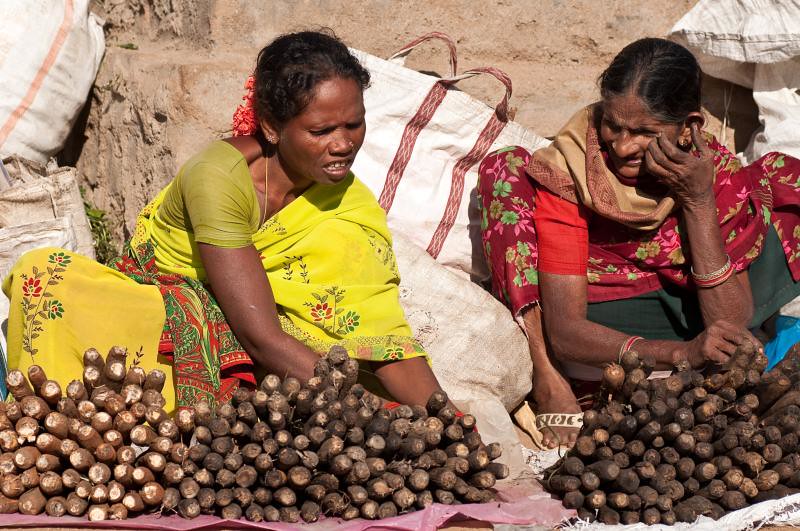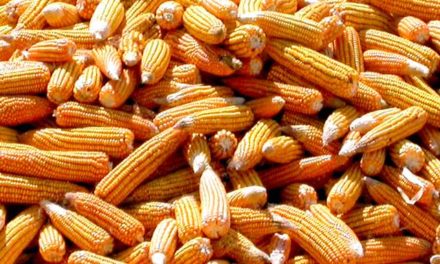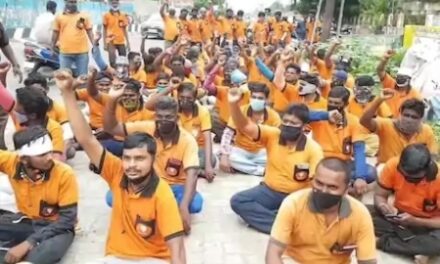30 April 2020
It is now a month since India went into complete lockdown on 26 March to contain the spread of Covid-19. As non-essential economic activity has come to a standstill, the lockdown has hit millions of people working in the informal sector. Although the Government has announced some relief schemes for the poor, several informal sector workers are outside the ambit of this relief package. As uncertainty about and fear of the pandemic continue to grow, India’s informal sector workers face extreme distress due to lack of state support and official apathy.
The informal economy encompasses many different kinds of economic activities, of which some are forest based. Nearly 23 per cent of India’s terrain comprises of forest area, and 200 million citizens are dependent on forests for their livelihoods.[1]Forest dwellers and tribal communities usually collect Minor Forest Produce (MFP) or Non Timber Forest Products (NTFP) from the forests and sell them to make a living. According to the Ministry of Tribal Affairs, tribal communities derive 20-40 percent of their annual income from MFP/NTFP.[2]
The list of MFP items include wild honey, tamarind, sal leaves, sal seed, mahua seeds, neem seeds, karanj seeds, mahua flowers and bay leaves which the communities gather and sell. A number of these items are seasonal and the selling period for these products is from March to June. Therefore, the lockdown at this time has put at risk the livelihoods of millions of forest-dependent communities.
Much before the COVID-19 pandemic hit the world, the forest communities of India were already living under precarious conditions. They were at the verge of getting evicted from the forests after the Supreme Court of India directed state governments to do the same in February 2019. The highest court’s judgement came as a result of a petition that was filed by various wildlife conservationist groups, against the constitutionality of the Forest Rights Act.Until 2006, there was no law that could guarantee tenurial security to forest dwellers who lived in the forests and therefore were considered as ‘encroachers’ in the forests. This changed after a landmark legislation, the Forest Rights Act 2006 (FRA) was passed to protect and safeguard millions of marginalised communities. The FRA recognises forest dwelling people’s right to settlement in forests and their customary rights over forest land upto 4 hectares. It also gives them legal ownership of their traditional habitation. One of the most important provision of the FRA is that it confers both Individual Forest Rights (IFR) as well as Collective Forest Rights (CFR). However, after thirteen years of enactment of the law, there are many who have not been able to access the rights guaranteed under the act. Data shows that since 2006, 4.22 million applications have been filed for the settlement of rights of which 1.94 million applications have been rejected.[3] The reasons for the huge gap in claims and settlements lies both in the limitations built into the legislationand various external factors including bureaucratic mismanagement. The act requires multiple departments, such as the Forest Department, Revenue Department and the Tribal Department to be involved in the process of reviewing and approving the claims. This leads to various contradictory interpretations by the respective departments thus leaving enough room for arbitrary decisions by the bureaucrats. Ironically, the petition filed at the Supreme Court of India by conservation groups highlighted that the 1.94 million people whose claims have been denied are illegal settlers. Millions of forest dependent communities came to the streets to protest the eviction order of the Supreme Court and it was finally stayed last year. Although the eviction has been halted for the time being, forest dependent communities are constantly under threat because of various new forest policies and mining policies that the Indian Government is trying to pass. While millions of forest dwellers were already trying to defend their dignity and livelihood, the current pandemic has brought upon them a new set of challenges.
In a telephone interview, Roma Malik from the All India Union of Forest Working People (AIUWFP) explained the conditions of forest dwellers in the state of Uttar Pradesh. In districts like Sonbhadra, Chandauli and Lakhimpur Khiri where the Union has a stronghold, forest dwellers have been going to the forest for collecting and harvesting of forest produce with physical distancing measures. She highlighted that tribal communities who have reclaimed land under the FRA have been doing collective farming and therefore have not faced food insecurity issues.She said that the next step for the Union would be to demand livelihood opportunities for migrant workers who have returned to the villages after the imposition of the lockdown. These migrant workers would not want to return to the towns and cities even after the lifting of the lockdown as there is extreme uncertainty about resuming work in the cities and fear of the virus.Malik says that the future course of struggle for the Union would include demands such as proper healthcare and education facilities in villages along with a strengthened fight for claiming forest land.
Dayamani Barla, a journalist anti-mining activist also reported similar stories from Khunti, a tribal village in Jharkhand state where she lives. In her village, forest workers have been facing difficulties in selling forest produce as the markets are shut. Taking advantage of this situation, traders are buying produce from the villagers at a much cheaper price than usual. The forest dwellers have no choice and are forced to sell their produce to these traders. Dayamani’s organisation, the Adivasi MulvasiAdhikar Raksha Manch that fights for the rights of tribal communities, has released a list of demands to mitigate the conditions of the tribal communities. The organisation has demanded that the government should procure forest produce from the villagers and urged the government to explore livelihood options for returning migrants. She stressed the need to immediately generate employment through the Mahatma Gandhi National Rural Employment Scheme (MGNREGA) and give powers to the Gram Sabha (village council) to decide on the nature of employment that would be best for migrant workers.
In Himachal Pradesh, one of India’s mountainous states, data already shows that majority of the claims under the FRA have been denied. Sandeep Minhas from the Himachal Niti Abhiyan expresses uncertainty about the upcoming season of herb collection as he does not know if the forest dwellers will be allowed to go to the forests to collect herbs and also if their produce will be procured by the Government. In Himachal Pradesh, herb collection from forests is usually done in June. Therefore, their organisation has demanded proper guidelines regarding maintenance of physical distancing, procurement and selling of forest produce and functioning of other forest-related activities from the Government before the harvest season starts.
A recent report by civil society organisations including All India Forum for Forest Movement (AIFFM), Campaign for Survival and Dignity, Kalpavriksh and independent researchers highlights some other issues that have affected tribal communities and forest dwellers during the lockdown. According to the report, lack of proper healthcare facilities in the tribal areas and low testing numbers of tribal populations increases the risk of infection. It also highlights the lack of information and awareness among the tribals about the pandemic and the required protective measures. The report also includes recommendations to the Centre on how to respond to the present crisis and help the tribal communities in need. It recommends the Ministry of Tribal Affairs to immediately set up a COVID-19 response cell and give specific guidelines to address the problems of forest dwellers and tribals. [4]
India’s forest community was already reeling under several issues. Diversion of forest land for non-forestry and developmental purposes has been of serious concern that has left forest dwellers even more vulnerable. The Government has also never developed any institutions for the procurement of MFP and as a result they are facing problems in selling their produce today, resulting in loss of livelihood. Therefore, the present crisis has only exacerbated the existing issues of the forest dwellers and tribal communities. Anecdotal evidence suggests that the Government has failed to respond systematically to the present crisis therefore putting at risk an already fragile forest-based economy and its dependent communities. Although the crisis has exposed the fault-lines of the system but it is also going to pave way for the emergence of new set of demands in the tribal areas, including livelihood, land rights, health and education facilities.
* is Program Officer with Focus on the Global South and based in New Delhi, India
[1]Food and Agriculture Organization of the United Nations Regional Office for Asia and the Pacific (2009), India Forestry Outlook Study.
[2]https://www.newindianexpress.com/nation/2020/mar/31/coronavirus-fear-looms-large-over-tribal-communities-2123864.html
[3]https://www.downtoearth.org.in/coverage/forests/forest-rights-act-who-is-the-encroacher-and-who-is-encroached-upon-6385
[4]https://www.mid-day.com/articles/tribals-at-increased-risk-from-covid-19/22763285









